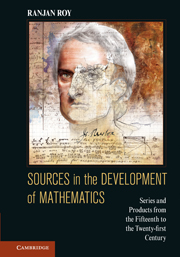 Sources in the Development of Mathematics
Sources in the Development of Mathematics Book contents
- Frontmatter
- Contents
- Preface
- 1 Power Series in Fifteenth-Century Kerala
- 2 Sums of Powers of Integers
- 3 Infinite Product of Wallis
- 4 The Binomial Theorem
- 5 The Rectification of Curves
- 6 Inequalities
- 7 Geometric Calculus
- 8 The Calculus of Newton and Leibniz
- 9 De Analysi per Aequationes Infinitas
- 10 Finite Differences: Interpolation and Quadrature
- 11 Series Transformation by Finite Differences
- 12 The Taylor Series
- 13 Integration of Rational Functions
- 14 Difference Equations
- 15 Differential Equations
- 16 Series and Products for Elementary Functions
- 17 Solution of Equations by Radicals
- 18 Symmetric Functions
- 19 Calculus of Several Variables
- 20 Algebraic Analysis: The Calculus of Operations
- 21 Fourier Series
- 22 Trigonometric Series after 1830
- 23 The Gamma Function
- 24 The Asymptotic Series for ln Γ(x)
- 25 The Euler–Maclaurin Summation Formula
- 26 L-Series
- 27 The Hypergeometric Series
- 28 Orthogonal Polynomials
- 29 q-Series
- 30 Partitions
- 31 q-Series and q-Orthogonal Polynomials
- 32 Primes in Arithmetic Progressions
- 33 Distribution of Primes: Early Results
- 34 Invariant Theory: Cayley and Sylvester
- 35 Summability
- 36 Elliptic Functions: Eighteenth Century
- 37 Elliptic Functions: Nineteenth Century
- 38 Irrational and Transcendental Numbers
- 39 Value Distribution Theory
- 40 Univalent Functions
- 41 Finite Fields
- References
- Index
17 - Solution of Equations by Radicals
Published online by Cambridge University Press: 05 June 2012
- Frontmatter
- Contents
- Preface
- 1 Power Series in Fifteenth-Century Kerala
- 2 Sums of Powers of Integers
- 3 Infinite Product of Wallis
- 4 The Binomial Theorem
- 5 The Rectification of Curves
- 6 Inequalities
- 7 Geometric Calculus
- 8 The Calculus of Newton and Leibniz
- 9 De Analysi per Aequationes Infinitas
- 10 Finite Differences: Interpolation and Quadrature
- 11 Series Transformation by Finite Differences
- 12 The Taylor Series
- 13 Integration of Rational Functions
- 14 Difference Equations
- 15 Differential Equations
- 16 Series and Products for Elementary Functions
- 17 Solution of Equations by Radicals
- 18 Symmetric Functions
- 19 Calculus of Several Variables
- 20 Algebraic Analysis: The Calculus of Operations
- 21 Fourier Series
- 22 Trigonometric Series after 1830
- 23 The Gamma Function
- 24 The Asymptotic Series for ln Γ(x)
- 25 The Euler–Maclaurin Summation Formula
- 26 L-Series
- 27 The Hypergeometric Series
- 28 Orthogonal Polynomials
- 29 q-Series
- 30 Partitions
- 31 q-Series and q-Orthogonal Polynomials
- 32 Primes in Arithmetic Progressions
- 33 Distribution of Primes: Early Results
- 34 Invariant Theory: Cayley and Sylvester
- 35 Summability
- 36 Elliptic Functions: Eighteenth Century
- 37 Elliptic Functions: Nineteenth Century
- 38 Irrational and Transcendental Numbers
- 39 Value Distribution Theory
- 40 Univalent Functions
- 41 Finite Fields
- References
- Index
Summary
Preliminary Remarks
The problem of solving algebraic equations has been of interest to mathematicians for about four thousand years. Clay tablets from 1700 BC Babylon contain the essence of the quadratic formula for solutions of second-degree equations. Unfortunately, the tablets do not indicate how the Babylonians arrived at the methods they described. Greek mathematicians later considered the problem from a geometric point of view. Indian mathematicians from the second century AD made significant advances in algebra, especially in the development of the kind of notational system by which the symbolic algebra of the seventeenth century was made possible. These Indian mathematicians also described a method for solving the quadratic using factorization by completing the square. Medieval Islamic mathematicians continued this algebraic tradition with several original contributions of their own. For example, they considered the cubic equation and gave algebraic and geometric methods for solving special cubics, although a general method for solving the cubic was not found until the sixteenth century.
Artis Magnae, sive de Regulis Algebraicis by Girolamo Cardano (1501–1576) presented the first known general method for solving a cubic, as well as a method for solving a quartic. Published in 1545, this book contained the work of Scipione del Ferro, Niccolò Tartaglia, Lodovico Ferrari, and Cardano himself.
Information
- Type
- Chapter
- Information
- Sources in the Development of MathematicsSeries and Products from the Fifteenth to the Twenty-first Century, pp. 311 - 325Publisher: Cambridge University PressPrint publication year: 2011